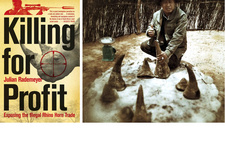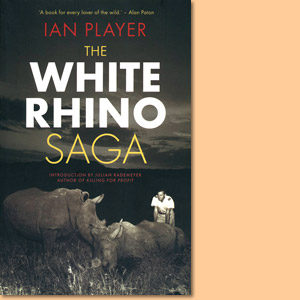South African Julian Rademeyer exposes illegal rhino horn trade
Killing for Profit by Julian Rademeyer is an eye-opening and horrifying two year investigation into the poaching and trafficking of rhinos in South Africa and the international illegal rhino horn trade, which threatens to make these mammals, which have survived on earth for over 50 million years, an extinct species.
Julian Rademeyer: I have never considered myself a 'conservationist' or an 'environmentalist'. But like many city-bound South Africans, I have something of a yearning for the escapism offered by the bush; for that magical illusion of the wild. It is something that most of us in South Africa take for granted. For close on twenty years, my work as a journalist has led me to focus on people. Rarely have I written about the environment. I've written about crime and courts, rape and murder, politics and corruption, war, unrest and famine, atrocities and human rights abuses. I've even 'paparazzied' a 'celebrity' or two. I've done stories I'm proud of and many that I would rather forget. There was a time when I thought I'd seen it all, when I sometimes arrogantly believed that nothing could shock or surprise me any more. And then this came along. A story that has angered and gripped me; a story that epitomises the rot that is steadily permeating the heart of South African society. But also a story of a handful of dedicated cops, prosecutors, conservationists and game farmers who, despite minimal resources and overwhelming odds, are trying to fight back. I didn't set out to investigate rhino poaching. In a way, I stumbled on the story. I'd seen the articles in the papers, read the angry comments, heard the cries of outrage, followed the reports of a rhino shot here, a poacher killed there, and learnt of the nameless arrests. But I hadn't taken much note. At the time I was mired in a seemingly endless pursuit of corrupt politicians, trying to find 'quick hits' that would guarantee page leads and a nice performance review. Then, quite by chance, I came across the story of a South African, a farm attack and rifles being smuggled across the border into Zimbabwe to be used to kill rhinos for their horns. I was intrigued. I wanted to know more. And so I dug. And the more I dug, the more I unearthed, and the more horrified I became. Horrified at the tales of ruthless criminal enterprise on a scale that I could not have imagined. What follows is the true story of poachers, killers, pimps, soldiers, generals, assassins, mercenaries, con men, prostitutes, gunrunners, game farmers, corrupt politicians, diplomats and scoundrels. It is also the story of one of South Africa's most precious assets: an animal that has been around for fifty million years. This is the rhinos' last stand. One that, tragically, they may not survive.
Namibiana Buchdepot reports: South African Julian Rademeyer exposes illegal rhino horn trade.
Empfehlungen
Save me from the Lion's Mouth: Exposing Human-Wildlife Conflict in Africa
Save Me From the Lion's Mouth investigates the increasing conflict between people and wildlife in Africa.
The White Rhino Saga
The White Rhino Saga is a tale of adventure, of Africa, of animals, and of the man who set out to save them.
Man-eaters, mambas and marula madness: A game ranger's life in the Lowveld
Mario Cesare, in man-eaters, mambas and marula madness, decribes his life as a game ranger in the Lowveld region.




